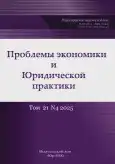Формирование моделей регионального экономического развития за счет деятельности территориальных экономических кластеров
- Авторы: Дубинский М.С.1, Трегуб И.В.1
-
Учреждения:
- Финансовый университет при Правительстве Российской Федерации
- Выпуск: Том 21, № 4 (2025)
- Страницы: 121-128
- Раздел: Математические, статистические и инструментальные методы в экономике
- URL: https://journal-vniispk.ru/2541-8025/article/view/316460
- DOI: https://doi.org/10.33693/2541-8025-2025-21-4-121-128
- EDN: https://elibrary.ru/BGGXSG
- ID: 316460
Цитировать
Аннотация
Цель исследования. В данной статье рассматриваются возможности использования моделей панельных данных для оценки влияния деятельности территориальных экономических кластеров на региональное экономическое развитие. Представлен обзор теоретических подходов к формированию панельных данных и их применению в экономическом анализе. Цель исследования заключается в выявлении зависимости экономического развития регионов РФ от деятельности территориальных экономических кластеров на их территории, которая может быть описана с помощью предложенного подхода оценивания потенциала кластера. Выводы. В результате исследования эмпирически проанализировано влияние рейтинговой оценки кластера, включающей такие факторы, как объем отгруженных товаров и услуг, численность рабочих мест на предприятиях-участниках и количество участников в составе кластера, на валовый региональный продукт; оценены фиксированные и случайные эффекты для учета индивидуальных особенностей регионов некоторых федеральных округов и кластеров на их территории; сформулированы практические рекомендации по разработке и реализации эффективной региональной политики, направленной на поддержку и развитие территориальных экономических кластеров с целью стимулирования экономического роста и повышения конкурентоспособности регионов.
Полный текст
Открыть статью на сайте журналаОб авторах
Максим Сергеевич Дубинский
Финансовый университет при Правительстве Российской Федерации
Автор, ответственный за переписку.
Email: MSDubinskij@fa.ru
SPIN-код: 6527-3072
ассистент Кафедры математики и анализа данных, аспирант Кафедры бизнес-информатики, Факультет информационных технологий и анализа больших данных
Россия, г. МоскваИлона Владимировна Трегуб
Финансовый университет при Правительстве Российской Федерации
Email: itregub@fa.ru
ORCID iD: 0000-0001-7329-8344
SPIN-код: 2192-9453
доктор экономических наук, профессор, профессор Кафедры бизнес-информатики, Факультет информационных технологий и анализа больших данных
Россия, г. МоскваСписок литературы
- Дубинский М.С. Анализ развития региональных промышленных кластеров Ростовской области // Инновации и инвестиции. 2023. № 6. С. 361–365. EDN: ZRQTVE.
- Дубинский М.С. Определение регионального развития промышленных кластеров методом годовой средней рейтинговой оценки // Reports Scientific Society. 2024. № 6 (50). С. 27–34. EDN: LDOGCC.
- Дубинский М.С. Роль ключевых социально-экономических показателей региона в развитии территориальных кластеров (на примере Ростовской области) // Наукоемкие технологии. 2023. Т. 24, № 6. С. 52–60. doi: 10.18127/j19998465-202306-06. EDN: NNMOJQ.
- Короткова К.С., Шафикова Н.Р. Понятие и характерные черты территориальных кластеров // Ученые записки Тамбовского отделения РоСМУ. 2018. № 10. С. 56–61. EDN: XSNTFR.
- Кудряшов В.С. Феномен экономических кластеров: понятие и характерные черты // Экономика и управление народным хозяйством (Санкт-Петербург). 2019. № 6 (8). С. 42–48. EDN: CAIPJU.
- Ратникова Т. Введение в эконометрический анализ панельных данных // Экономический журнал Высшей школы экономики. 2006. Т. 10, № 2. С. 267–316. EDN: HTXXVB.
- Трегуб И.В., Фунтова Д.В., Етерскова Я.С. Анализ влияния монетарной и экономической политики на рост ВВП Российской Федерации в 2024–2025 годах // Экономика. Налоги. Право. 2024. Т. 17, № 1. С. 44–55. doi: 10.26794/1999-849X-2024-17-1-44-55. EDN: BGNPEN.
- Трегуб И.В., Сабитов Б.Ш. Анализ инновационной активности в России // Экономический анализ: теория и практика. 2024. Т. 23, № 7 (550). С. 1306–1316. doi: 10.24891/ea.23.7.1306. EDN: NPYKRU.
- Трегуб И.В. Разработка экономического инструментария стабилизации экономики региона: опыт Ярославской области // Управление и политика. 2022. Т. 1, № 3. С. 27–34. doi: 10.24833/2782-7062-2022-1-3-27-34. EDN: UHOJNC.
- Трегуб И.В., Иако М.Д. Эконометрический анализ эффективности государственных мер финансового стимулирования развития региона // Финансы: теория и практика. 2022. Т. 26, № 3. С. 129–145. doi: 10.26794/2587-5671-2022-26-3-129-145. EDN: CKZDWE.
Дополнительные файлы









